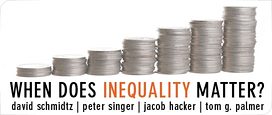David Schmidtz acknowledges the obvious point that the prices of goods and services vary in accordance with their scarcity, not with how important they are to us. He admits that we may know that those who supply scarce goods and services would be willing to supply their goods and services even if the price were far lower, but then asks: “What would get us from here to a conclusion that we have a right to prevent would-be buyers from paying market rates for services in great demand?”
But why is that the question to ask? Why should we assume that sellers have the right to get as much as the market will bear? Two families acquire similar looking acreages of Texas grazing lands. One is fortunate: their land has oil beneath the surface and they become fabulously wealthy. The other is unfortunate: their land has no oil, and despite working as hard as their neighbors, and applying similar intelligence, they remain poor. What gives the former “a right” to their wealth? In my view, nothing. We believe in an inherent right to property because we believe that somehow rugged individuals living in a state of nature can acquire and retain wealth. That is nonsense, of course. Oil would have little value if society did not provide the infrastructure that enables us to use it. Wealth does not exist without society, and the security that society provides.
So instead of asking what gets us to the conclusion that “we have a right” to interfere with market mechanisms, why not ask, instead: “Would interfering with market mechanisms make people, on the whole and in the long run, better off?” That’s an empirical question, and the answer will obviously depend on the precise nature of the interference, and the context in which it occurs. Often, the answer will be in the negative. But sometimes, it might be “yes”. Bertram and Brighouse, in their blog, mention the evidence that in societies that are more egalitarian than the U.S., those at the bottom are significantly better off, while there is ample reason to believe that those at the top would not be significantly worse off if they had a little less income. When such opportunities to make people better off are on offer, we should not allow vague ideas of supposed rights to block governments from improving the welfare of those who live within their jurisdiction.

